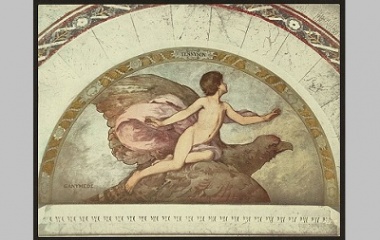- Pronunciation: gan-uh-meed
- Origin: Greece
- Role: Mortal prince of Troy
- Parents: Tros and Callirrhoe
- Brothers: Assaracus, Ilus
Who Is Ganymede?
Ganymede was the son of the Tros of Dardania, the ruler of Troy, and the lovely nymph Callirrhoe, the daughter of the river god Scamander. The most handsome mortal boy in all of Greece, Ganymede achieved divine status as cup bearer and servant of the gods. As the lover and companion to Zeus, he was eventually gifted with the legacy of being immortalized amongst the stars.
Origin
The Greek word ganumai translates togladdening and medon has two meanings. The first is prince and another translation is genitals. The derivation of the name Ganymede seems to have an intended double meaning.
The exceptionally handsome prince stood on Mount Ida tending his father’s flock of sheep. Zeus was so enchanted with his appearance he transformed himself into an eagle, picked up Ganymede and brought him up to Mount Olympus, the home of the gods in the heavens.
Upon hearing that King Tros was devastated about the disappearance of his son, Zeus summoned the god Hermes and told him to deliver two special horses to Tros as compensation. It is said the horses were so fast, they could run over water. Later, Heracles would ask for these same horses as payment for killing the sea monster that attacked the city of Troy. Hermes also promised that Ganymede would become divine and act as cup bearer of Zeus and the gods.
Now, there were other things going on in the house of Zeus before he grabbed a handsome young mortal and carried him home. Although known for philandering, Zeus was married to Hera, and their youngest daughter Hebe had the cup bearer position. It was their daughter Hebe’s duty to serve the guests of her parents nectar and ambrosia. This is the food and drink of the gods and the sustenance of immortality. One day Hebe tripped and had an embarrassing wardrobe malfunction. Her breasts fell out of her dress. Apollo fired her from her job as cup bearer and Zeus immediately replaced her with Ganymede. Hera was particularly irritated and jealous that the new love interest of her husband was a young boy and that her daughter was replaced by him in an instant.
The gods were very happy with their new handsome male cup bearer, with the exception of Hera, who abandoned the Trojans and shifted the alliances of the Trojan War in her anger and jealousy over the affair. Eventually, after the wrath of Hera’s anger settled in, Zeus turned Ganymede into a constellation called Aquarius, the water bearer, and he was immortalized amongst the stars.
Historic Influence
The ancient Greek concept of sexuality and virility, at least for the gods, was expressed as a mixture of both heterosexual and homosexual relationships. Zeus and other gods had male lovers, and the most infamous of all was the handsome prince Ganymede.
He is portrayed in numerous museum quality paintings and sculptures, including Peter Paul Rueben’s, The Rape of Ganymede, which is on display at the Museo del Prado in Madrid, and Rembrandt’s version with the same title, which is at the Gemaldegalerie in Dresden Germany.
Ganymede is also the name William Shakespeare chose for the alter ego of protagonist Rosalind in his comedy of love, As You Like It. Rosalind dresses as a man and goes undercover with her male identity as she travels into the Forest of Arden. Hardly a random choice of names, considering the legendary mythology.
Greek historian Apollodorus argued that the myth was an expression that men did not need women or their attention to exist. However, the classic philosopher Plato used the legend as justification for the sexual feelings he had for his male students.
The consensus seems to be that the allegory of the myth and the legacy of handsome Ganymede is god of homosexuality.










